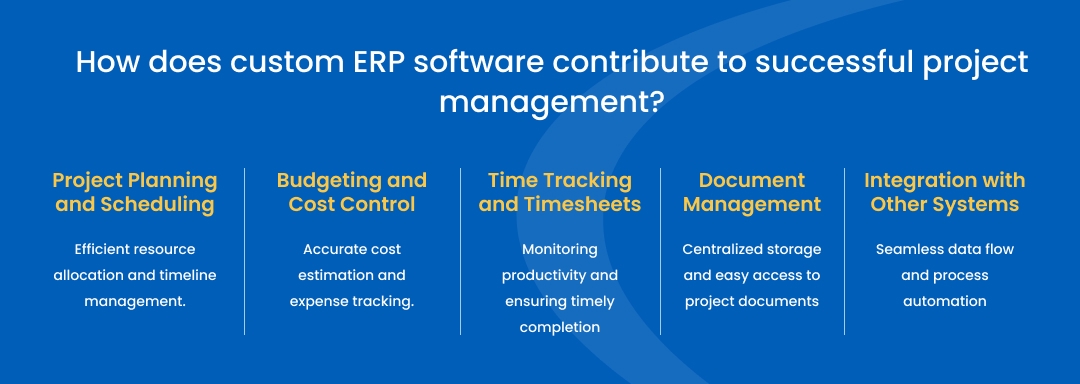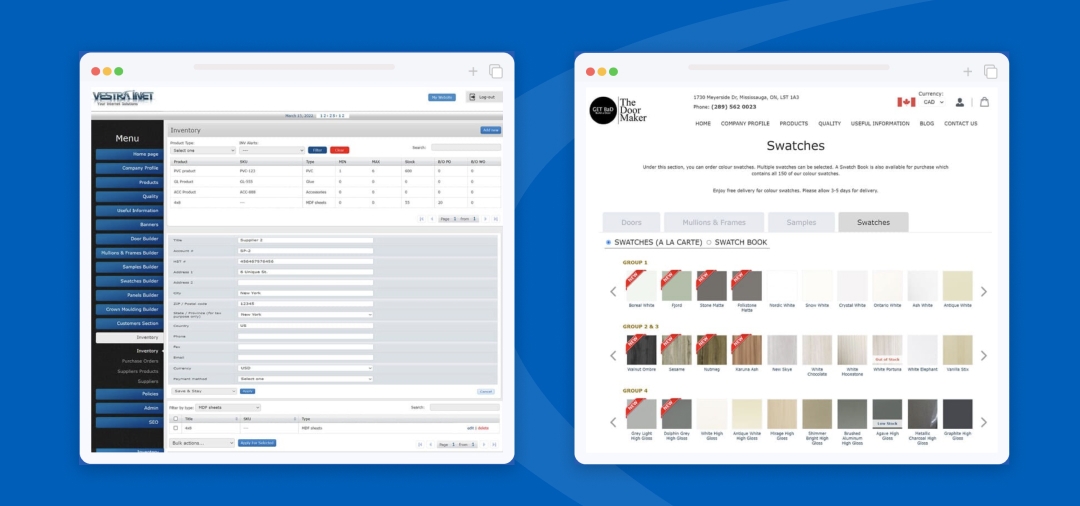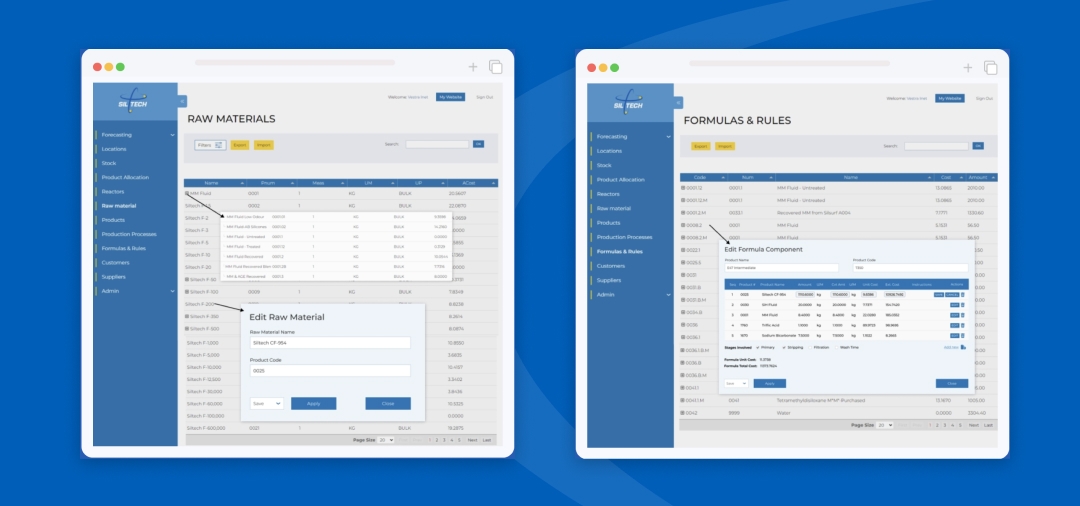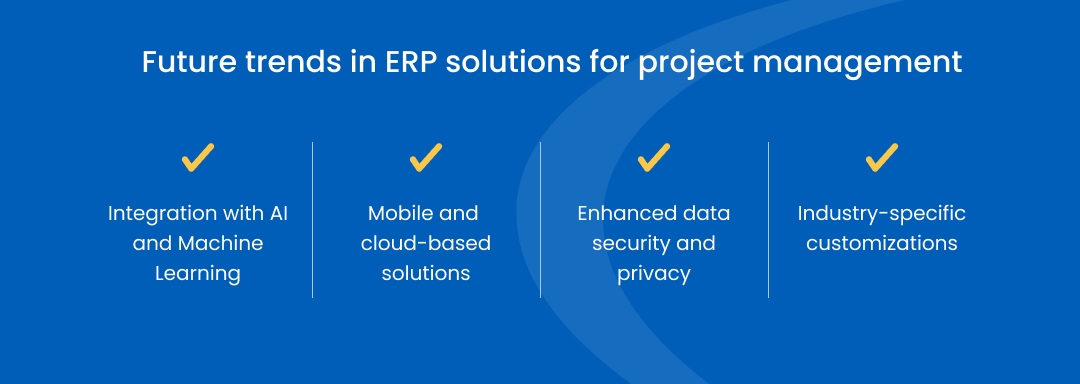Role of Custom ERP Solutions in Project Management

In this article, we will explore the role of custom ERP solutions in project-specific operations. We will cover aspects such as the benefits, the key features of custom ERP software for project management, challenges and considerations and more. We will also look at aspects such as future trends in the development of ERP software for project management and provide you with a few case studies to help you get a better understanding of what is at stake.
ERP Software for Project Management: A Cutting-Edge Solution To Start Managing Projects Efficiently
With the graduate transition to more sustainable business management practices, many industries globally switch from ongoing operations to a project-based approach. That means companies organize their work around specific projects, tailoring their activities to meet specific needs of their clients. Such an approach has proven to be very effective as it allows companies to manage their resources more effectively as well as adapt to ever-changing market conditions.
With such a switch, the role of custom ERP solutions shifts from a mere database-driven system to a more strategic tool companies use to efficiently manage individual projects rather than oversee the whole business. That being said, the role of custom ERP solutions in project management goes far more beyond storing and retrieving data.
Benefits of Custom ERP Solutions in Project Management
Every project has its objectives achieved through successful project management practices. The universal objectives of pretty much every project are to complete projects on time, within budget, and to the desired quality standards. The role of custom ERP software in this context is to facilitate efficient project management workflow by providing a centralized platform for information storage and exchange, resource management and accurate forecasting - all being crucial for effective planning, execution, and completion of projects.
Enhanced Collaboration and Communication
Custom ERP software is a centralized hub used for storing project data and information which can be easily and quickly accessed by the project team members. According to a source, easy data access facilitates timely decision-making which is extremely important for projects with strict deadlines. Moreover, customized ERP solutions can include a built-in collaboration tool which enhances communication and data exchange between project teams, stakeholders and clients.
Improved Resource Management
Effective resource management is one of the key aspects of a successful project management. Custom ERP software helps allocate resources in the most efficient way possible allowing project managers utilize them for maximum productivity. Project managers can forecast how much resources are needed to complete a certain project, avoiding resource overload and underutilization.
Real-Time Data and Analytics
Real-time project progress tracking and analytics is crucial for successful project management. With custom ERP software, managers have the capability to track project progress, budgets and resource usage in real-time and make informed decisions as to how to further optimize project performance.
Streamlined Workflow and Processes
An optimized and streamlined workflow is an integral part of a successful project management. Thanks to the automation features in custom ERP software, teams can automate many manual tasks, reducing manual effort, errors and optimizing efficiency. Tasks are executed in a streamlined manner, consistently and accurately, resulting in a more efficient workflow.
Proactive Risk Management
Identifying risks early in the project management is a smart practice project managers should implement. Custom ERP solutions have tools that help identify risks and potential issues. Project managers can proactively address these risks, minimizing their impact on the project outcome.
Key Features of Custom ERP Solutions for Project Management
When it comes to custom ERP software for project management, it is important to understand that their features differ slightly from those of mass market ERP solutions. How? While traditional ERP solutions are built to meet the general needs of the market and standard workflows (for example, the manufacturing process of certain products), project management ERP solutions are designed to facilitate the management of a specific project or projects. Here are some key features an ERP system for project management would have:
Project Planning and Scheduling
Effective project management starts with proper planning and scheduling. Custom ERP software provides tools to create detailed project plans, set timelines and assign tasks. These tools help structure the workflow in a way that it becomes easy to track the progress of the project and adjust the timelines accordingly.
Budgeting and Cost Control
Effective financial management is the pillar of any project management. That’s why custom ERP software for project management has to have a budgeting and cost control module. This module helps track expenses, monitor financial performance and stay on top of the project budget.
Time Tracking and Timesheets
Time tracking and timesheets help monitor productivity and manage labor costs. Automated timesheets module help record work hours correctly, helping managers better track project progress and allocate resources more efficiently.
Document Management
For maximum workflow efficiency, team members must be able to easily access and share documents between each other. Custom ERP software for project management can have a built-in document management module that facilitates easy and efficient file sharing, promoting better collaboration between team members.
Integration with Other Systems
Businesses often operate on multiple software platforms. So, it’s important for custom ERP software to be able to integrate with other systems. Easy integration is important for seamless data flow and data synchronization between different platforms so that teams can collaborate more effectively.

Implementation of Custom ERP Solutions
Project management operations differ much from standard business management ones. Project management focuses on achieving specific goals and has certain deadlines and budgets allocated to achieve those goals. Given these specific parameters, custom ERP software must be customized in a way that it adapts to the project management workflow and helps teams achieve their goals and KPIs fast and in the most efficient way possible. Here’s a brief overview of the implementation of ERP solutions in project management.
Needs Assessment and Requirements Gathering
At this stage of ERP implementation, the ERP provider will conduct a project needs assessment analysis as well as gather detailed requirements and expectations, compiling them into a comprehensive project plan.
Customization and Development
After all software requirements are in place, development teams will begin to customize and build the software, polishing it to the client’s needs and specifications. This will require multiple rounds of testing and feedback, which is a critical step in ensuring the custom ERP software for project management meets the client’s needs.
Testing and Training
Testing and feedback are critical steps in ERP implementation. These steps allow developers to identify and eliminate any bugs and issues before the final version of the software is deployed. Training is another important step. It is critical that the client and their employees feel comfortable with the new software, leaving no space for confusions.
Deployment and Integration
Deployment of custom ERP software for project management takes place in a phased manner. This is done to ensure that the core functionalities function smoothly, gradually transitioning to deploying additional modules until the entire system is deployed and functions as it was intended.
Continuous Improvement and Support
It is important to conduct periodic performance reviews to ensure the software is performing as intended. Barely ever custom ERP software for project management functions perfectly from the moment it is deployed, and that is normal. Continuous improvement is another aspect of the software post-implementation and maintenance ro make sure it continuously meets the needs of the client.
Case Studies and Success Stories
Below are a few case studies showcasing the successful implementation of custom ERP software solutions for companies that operate on a project-based business model.
Case-study: Streamlined manufacturing process with easy order management and order tracking capabilities.
Company profile: The Door Maker. A Mississauga-based cabinet doors manufacturer, specializing in producing highly customized kitchen cabinet doors.
Industry: manufacturing.
Challenges: Extensive catalog with hundreds of door configurations for customers to choose from and for staff to process. Complex, multi-stage manufacturing process involving multiple sequential operations.
Solution: A multi-module custom ERP software with product configurator, custom quotation software and production management and reporting system. The product configurator software offers a wide range of customizable attributes for a kitchen cabinet door such as panel profile, door style, edge profile, front colour, back colour, exact dimensions, quantity, and more, simplifying the process of designing and ordering cabinet doors for the customer and automating order management for the staff. Custom quotation software allows the company to automate quote creating processes with the utmost accuracy. The production management and reporting system improves production timing, inventory management and the ability to monitor various aspects of the process.

Case-study: Improved production quality and reduced production delays achieved through automated manufacturing process.
Company profile: Siltech. A chemical manufacturing company based in Toronto, Canada specializing in organo-functional silicone compounds and resins.
Industry: manufacturing.
Challenges: Accurate calculations and delivery of the required quantity of a particular resin on a stipulated date to achieve a more streamlined manufacturing process. The need to accurately sequence the addition of chemicals during the manufacturing process.
Solution: Custom ERP software with production management features. The production forecasting system utilizes the company's previous work order history to predict the required amount of resin or product to be produced and delivered by a specific date. It also factors in the current facility capacity before making detailed predictions. Additionally, a production monitoring module was implemented, enabling the system to accurately assign the appropriate facility and tank based on the current work order. This automation and optimization are achieved by monitoring the current production setup across multiple facilities. A sequence management feature was also integrated, using previous work orders to determine the correct sequencing of chemicals. Moreover, a standard reporting system was added to enhance the speed and accuracy of report generation.

Challenges and Considerations
As much as companies are willing to streamline operations and project management to improve efficiency, any changes in the routine workflow present challenges, primarily in the context of adopting the new software. Migrating the data from one system to another, new software integration challenges, employees’ reluctance to embrace the new software, all these could be a serious obstacle on the way to a successful implementation and adoption of custom ERP software for project management. Below is a brief overview of the most common challenges and ways to tackle them.
Change Management
Employees often resist change as it involves new challenges and a certain level of uncertainty. It is important for the management to handle change management in a way that all employees feel included and part of the process as well as address all their concerns on time and with care. Effective change management is often a critical aspect in the implementation of custom ERP software in project management. The software may be great, but if employees refuse to adopt it, the entire project will be doomed.
Employees may resist switching from familiar systems to custom ERP software. Comprehensive training and change management strategies are essential to address this resistance.
Data Migration and Integration
Data migration is a significant challenge in ERP implementation. Companies often run on large volumes of data which is often diverse in nature. When it comes to transitioning to a newer system, not all data needs to be migrated, so another challenge here is to identify which data bears the most value and which will only clutter the system.
Integration is another problem companies face when implementing new software. Custom ERP software for project management often needs to be integrated with other systems and applications which are equally essential for the smooth functioning of the organization.This poses a challenge for the development teams to integrate these systems in a seamless manner.
Data migration and software integration constitute a good chunk of the ERP implementation effort. However, careful planning, robust tools, and effective communication will make ERP implementation a successful endeavor with positive returns.
Scalability and Flexibility
Being able to adapt to the changing client needs, in particular, and market conditions, in general, is a key factor that determines the sustainability of a business; and ERP solutions vendors must take this into account. Clients need a system that is easily scalable and flexible to meet their ever-changing needs.
Thus, clients and their chosen software vendors should avoid monolithic software at all costs and aim for solutions that can scale easily as the client’s needs evolve and markets change.
Vendor Selection and Partnership
Choosing the right custom software development company is another challenge for various reasons. Companies are often faced with the problem of finding a vendor with enough expertise in their specific industry; or finding a reliable vendor who could turn into a long-term partner rather than just a one-time software development service provider.
Extensive research and careful selection can help companies find the right software provider. Asking the right questions and getting exhaustive answers from potential vendors will help in choosing the right partner for the project.
Future Trends in ERP Solutions for Project Management
Custom ERP software for project management is a growing field with new trends and progressive innovations introduced every year. Below, we have compiled four trends that are likely to shape the nearest future of ERP software for project management.

Integration with AI and Machine Learning
AI has generated significant excitement in the tech industry. What once seemed like a far-fetched concept has now become a ubiquitous innovation that every software development company is considering. Several major ERP software development companies, like SAP, Oracle and Microsoft, are already integrating AI technology into their products. Although, while still at its emergence stage, AI is already being used by many companies to speed up workflow, automate manual tasks and analyze big volumes of data.
According to WorldMetrics.org, 21% of tech executives said their organizations incorporate AI in software development to improve efficiency. Another statistics claims that AI technology in software development can reduce operational costs by 62%. It will take time before AI becomes an integral part of the software development process. However, what is certain is that the trend is here to stay.
Mobile and Cloud-Based Solutions
As project needs tend to evolve, scalability becomes a major factor in choosing the right ERP solution. Cloud-based ERP solutions can easily be scaled up or down to align with the project requirements. Cloud-based ERP software has a flexible infrastructure, making it an attractive choice for organizations whose needs are project-based and often dynamic.
Mobile ERP solutions are also gaining traction in the market with many vendors already offering mobile-responsive ERP applications to their customers. The benefits of mobile-friendly ERP solutions are evident: customers can access business data and execute business-related transactions anytime from anywhere using their smartphones. Such flexibility enables ongoing project management in real-time with no need to log into a laptop.
Enhanced Data Security and Privacy
ERP solutions are often required to handle large volumes of sensitive data which accumulate as the project progresses. In such scenarios, custom ERP software needs to have a robust security infrastructure in place. Moreover, that infrastructure needs to be continuously updated and improved to ensure the highest level of data security.
Advanced encryption, multi-factor authentication and role-based access control are some of the most commonly used security measures in custom ERP software for project management. In addition to these measures, modern ERP systems are required to comply with various global data protection regulations such as GDPR, CCPA and more.
Industry-Specific Customizations
Customizable ERP solutions are becoming a popular trend among project-based organizations for a reason. Industry-specific customizations provide companies with ERP software that is exactly tailored to their industry or project needs. This ensures a maximum alignment of the ERP system with the project needs.
When it comes to regulatory compliance, the ability to customize ERP solutions to the specific industry needs provides companies with greater peace of mind that their software meets compliance requirements.
Conclusion
In conclusion, custom ERP solutions play a crucial role in project management, offering a number of benefits such as enhanced collaboration, improved resource management, real-time data analytics, streamlined workflow, and proactive risk management. These solutions are designed to meet the unique requirements of project-based businesses, ensuring efficient planning, execution, and completion of projects.
While challenges such as change management, data migration, scalability, and vendor selection exist, careful consideration and effective strategies can mitigate these challenges. Looking ahead, future trends indicate a shift towards integration with AI and machine learning, mobile and cloud-based solutions, enhanced data security and privacy, and industry-specific customizations, making custom ERP software a key player in the future of project management.
